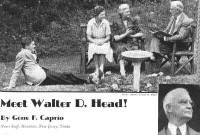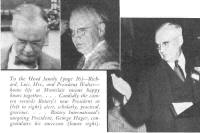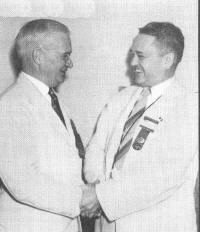|

AS I ENTERED the editorial
sanctum, the boss sat thumbing a newspaper clipping. Without looking up,
he greeted me with, "Gene, Walter Head has been elected President of
Rotary International. Nearly everybody and his brother here in Montclair
knows that Mr. Head is headmaster over at the academy, but THE ROTARIAN
magazine wants a story that tells the sort of fellow he is. Get it. A
clean‑cut word picture of the man. I'll leave the details to you."
So long as Rotary's new President
wouldn't be back in Montclair until the next day, I decided to do a
little "groundwork "‑talk to some of the men who knew him intimately in
business and the field of education. I headed for the academy to talk
with his associates. I listened to John E. Smith, for 19 years a close
associate of Mr. Head, first at The Nichols School in Buffalo, New York,
now with him at Montclair. "It is no accident," said Mr. Smith, "it was
not merely ambition nor sheer ability that shaped his career and
fostered his accomplishments."
Frankly, I was skeptical.
Obviously, Walter Head is a quality fellow, I told myself, but‑well,
newspapermen are a bit skeptical. I decided that Mr. Smith was putting
it on a bit too thick. Surely a schoolmaster, I said to myself, even one
such as Mr. Head, is not blessed with a lucid mind and a personality
that make him Charles Lamb and Thomas Jefferson all in one.
So I continued my calls. I
stopped to chat for a few minutes with men with whom I knew Mr. Head had
had business dealings. They but reiterated what Mr.
Smith had said. Weakening
rapidly, but still swinging, I got around to "the boys who have been in
his classrooms through the years."
But still I wasn't satisfied. It
was late in the afternoon when I finished my "groundwork." An
interesting character, yes, but on the morrow I'd dig, into the man
himself, find what he thought about, learn something of his part in a
movement which was represented by business and professional men in more
than 75 countries, and to which men were admitted without regard to
race, color, or creed‑over 200,000 of them.
 Suddenly
the light struck. The man I was to interview had been signally honored.
I could think of no other organization whose tentacles are fastened in
the soil of so many lands. A man who is considered fit to be the leader
of such a world movement must have something most men do not. That he
does have was to be made apparent even to a cynical reporter within the
space of some 12 hours. Suddenly
the light struck. The man I was to interview had been signally honored.
I could think of no other organization whose tentacles are fastened in
the soil of so many lands. A man who is considered fit to be the leader
of such a world movement must have something most men do not. That he
does have was to be made apparent even to a cynical reporter within the
space of some 12 hours.
But comment on that can wait a
moment until I bring Walter Head into the picture in the accepted way‑by
telling something of his boyhood, his young manhood, his progress in
education, his early days in Rotary.
A cool, case‑hardened news hawk
‘gets the story' of Rotary's new
President‑and, in reporting it,
finds superlatives are requisite.
Walter D. Head was born in
Revere, Massachusetts, a community of 5,000 New England villagers. His
home had few conveniences we now demand as part of our home life. From
his mother, a Hancock descended from the John Hancock of Revolutionary
War fame, he absorbed the traditions of Yankee forthrightness,
perseverance, thrift, and independence. From his father, who learned to
listen to the aches and pains of the outside world through the medium of
his newspaper office, he acquired the sympathy and tolerance which have
since endeared him to all who know him.
In the manner that is often
visualized by the motion pictures, young Walter filled the long Summer
days and the long Winter evenings with chores, studies, his play. He
walked four miles to and from high school, where he, one day, decided
that he would study languages and that the field of teaching was to be
his life objective. At 20 he was one of the youngest graduates in his
class at Harvard, being awarded his bachelor's degree in 1902. Then
followed a period of teaching in schools in. Boston and Southborough. At
22 he was appointed to a post at Philips Exeter Academy, where some of
the "boys were older than I was." With a smile he recalls that after the
duties of the first day at Philips Exeter, he entered the dining hall
for dinner. As he headed for the table at which faculty members ate, a
waiter cautioned him, "Only teachers sit there," gently urging him
toward the students' tables.
Just teaching, however, did not
satisfy Walter Head. More than ten years after leaving Harvard he
decided to work for a master's degree in education, for he wanted to be
a school executive as well as a teacher. He was awarded the coveted
degree in 1913 after study in the graduate school of Columbia
University. Subsequently he served as a high‑school principal for six
years at Haverhill, Massachusetts. Transferring to New Rochelle, New
York, he remained there until 1917, when he was appointed to the
headmastership of The Nichols School in the city of Buffalo.
It was while in that city that
Walter Head entered Rotary in 1920. Quickly his leadership was
acknowledged, and within two years of his admittance to the Buffalo Club
he was elected President. But in 1925 he was called to the
headmastership of the Montclair Academy. Once again he became a
Rotarian‑this time as a member of the Rotary Club of Montclair. In two
years Montclair Rotarians made him their President‑in 1927. Throughout
his District‑then No. 36‑he became known as a man keenly interested in
the development of the Rotary ideal, and in 1931‑32 he was elected
Governor of the District. |
Then followed service on a number
of international Committees: a member of the International Service
Committee in 1932‑33 and its Chairman in 1933‑34; Chairman of the
Vocational Service Committee and a member of the Aims and Objects
Committee in 1935‑36; a member of the Aims and Objects Committee and
Chairman of the International Service Advisors in 1937‑38. Last year he
was Chairman of the Aims and Objects Committee, and a member of the
Convention Committee. In 1934‑35 he was a member of the Board of
Directors and Third Vice ‑President. And now President for 1939‑40!
Which brings us down to the
moment when I entered the office of the headmaster of Montclair
Academy‑and an interesting moment for this newspaperman. Not easily put
on paper is the impress of a personality. Not quickly does the mind
absorb the ideas of a man whose field of ‑work has been humanity‑boys
and men‑not alone in his own country, but in scores of countries. But I
must say this: If Rotary does not flower during the year with added
brilliance, if Rotarians everywhere do not catch the inspiring
enthusiasm of Walter D. Head, I for one would not want the job of
explaining the failure.
Sparkling blue eyes‑to detail
those outward characteristics of the man who sat before me‑silvery hair,
a bearing dignified and scholarly, a mouth that tips upward easily at
the corners, well built, 57 years of age according to Who's Who, genial
and gracious of manner, by any measure a true gentleman. These, as I
have said, are the outward signposts to the man's personality.
And the inner? I found them as I
explored the mind of the man through conversation. I had heard from
other Rotarians of the four lanes of Rotary service: Club, Vocational,
Community, International. Deviously and skilfully did President Head
lead me up and down those lanes, exploring their possibilities in a
world‑wide organization, relating to me how, powered by the Rotary
slogan of Service above Self, men were fulfilling the movement's
emphasis on the individual.
The breadth of a man's vision may
often be measured by the length of his viewpoint‑in world affairs, for
example. "World trade," Mr. Head told me as we surveyed Rotary's
international aspect, "carried on for centuries in sailing ships, has
long since abandoned those stately vessels, dependent upon winds and
tides, for the modern steamship with its engineering is independent of
the vagaries of the sea; and today the motor ship and the giant airplane
threaten to make the steamship obsolete. Adaptation and change are
always at work to develop methods of saving time in transportation and
communication. On the other hand, the importation and exportation of
ideas from one country to another‑the outstanding hope of saving
civilization ‑still goes on in the same way as it did in the ancient
world when the Mediterranean limited the international market and the
oceans were uncharted. Trade no longer moves in galleons. Man is more
mobile than in Viking days, but Babel's curse is still upon us."
Those who have followed the
career of Walter Head while he has lived in Montclair know him as a man
not surcharged with the desire to give a message to the rest of the
world. Walter Head is his own message: tolerance, good nature, the
desire to intercommunicate ideas and to understand the opponent's side
of the issue. "Where people differ," he gently reminded me of a
statement which he once made, "all are partly right." A sincere democrat
as perhaps Voltaire might have visualized one, Walter Head becomes
impatient with boundaries and border guards. As a member of the
International Auxiliary Language Association's Committee on Co6peration
with Rotary, he has been active in forwarding the movement for a world
language through which men can better learn to know one another. As
Rotary's international President, he will visit many lands and be
understood in several tongues, for he speaks French, German , and
Spanish, as well as English.
This is the man, then, who will
head Rotary in 1939‑40, and I do not mean to give vent to an idle pun on
his name. For Walter Head's forte is leadership. One cannot talk long
with him before one realizes that. One cannot work long with him, say
his associates, and not quickly appreciate his keen insight into
problems of his own field, of his community, of the world at large. Mr.
Head has long been active in maintaining a clean front yard in his
community viewpoint; from it he will move forward to do his part in
accomplishing the same result in a period about which Walter Lippmann
has said, "Nobody alive today has ever seen the time more dangerous or
more fraught with possibility of woe for the human race than is the case
today."
 But,
someone is certain to ask, has President Head maintained himself in
cloistered halls while looking through windows at the world? No one
would say that who has an insight into the home life of Rotary's
President and his lady and their two children. Here indeed is a family
which is both independent and dependent. Independent in idea, dependent
in those qualities from which comradeship and happy fellowship regularly
spring. But,
someone is certain to ask, has President Head maintained himself in
cloistered halls while looking through windows at the world? No one
would say that who has an insight into the home life of Rotary's
President and his lady and their two children. Here indeed is a family
which is both independent and dependent. Independent in idea, dependent
in those qualities from which comradeship and happy fellowship regularly
spring.
And for those who believe‑and
their name is legion‑that hobbies and love of sports provide a key to a
man's personality, I will add this: Roaming through the Head household
is a large and mysterious cat, Peter by name. Why he is there no
associate would confide. But those who would comment called attention to
the fact that scattered throughout the house are numberless china cats
of assorted sizes, picked up during the Heads' travels in the United
States and abroad. Collecting these feline samples is a hobby.
And of sports? Well, "he plays a
good game of tennis, a fair game on the fairway, and loves to get
together with the boys for a gustatory debauch and a gabfest when the
Mrs. is visiting somewhere or other."
This sketch of President Walter
D. Head is informal. It is the only way it could be, for it is based on
an insight into the life and mind of a man to whom fellowship is a
common leavener. He has made the phrase "fellowship of man" throb with a
heart‑warming spiritual glow. Rotary is fortunate in having selected
him.
Written for the August 1939 issue of The
Rotarian by Gene F. Caprio, News Staff, Montclair, New Jersey
Times.
Prepared by
Wolfgang Ziegler
31 August 2003 |

